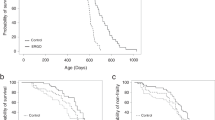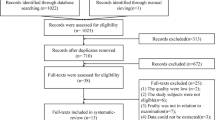Abstract
Postoperative delirium (POD) is a common and serious neuropsychiatric syndrome among older patients, and lacks effective therapies. Omega-3 fatty acids, possessing anti-inflammatory and antioxidant properties, have shown potent neuroprotective effects in several diseases. The present study investigated whether omega-3 fatty acids could exert a neuroprotective role against POD in aged mice. A mouse model of POD was established to explore the role of omega-3 fatty acids in laparotomy-induced delirium-like behavior by evaluating systemic inflammatory changes, neuroinflammation, oxidative stress, and behavior at different time points in aged mice. Oral gavage with omega-3 fatty acids (300 mg/kg) for 3 weeks before surgery significantly attenuated anesthesia/surgery-induced POD-like behavior and the accumulation of proinflammatory cytokines from the peripheral blood in aged mice. Moreover, it also remarkably mitigated neuroinflammation and the oxidative stress response (malondialdehyde [MDA] and superoxide dismutase [SOD]) in the prefrontal cortex and hippocampus of surgical mice. Our findings provided evidence that pretreatment with omega-3 fatty acids may play a vital role in the treatment of POD through mechanisms involving its anti-inflammatory and antioxidant effects, which may be a promising prevention strategy for POD in aged patients.







Similar content being viewed by others
Data Availability
Upon a reasonable request, the data supporting the results of this study can obtain from the corresponding authors.
References
Li T, Li J, Yuan L, Wu J, Jiang C, Daniels J et al (2022) Effect of Regional vs General Anesthesia on incidence of postoperative delirium in older patients undergoing hip fracture surgery: the RAGA Randomized Trial. JAMA 327(1):50–58. https://doi.org/10.1001/jama.2021.22647
Aldecoa C, Bettelli G, Bilotta F, Sanders RD, Audisio R, Borozdina A et al (2017) European Society of Anaesthesiology evidence-based and consensus-based guideline on postoperative delirium. Eur J Anaesthesiol 34(4):192–214. https://doi.org/10.1097/EJA.0000000000000594
Yang Y, Wang T, Guo H, Sun Y, Cao J, Xu P et al (2022) Development and validation of a Nomogram for Predicting Postoperative Delirium in Patients with Elderly Hip Fracture based on data collected on admission. Front Aging Neurosci 14:914002. https://doi.org/10.3389/fnagi.2022.914002
Androsova G, Krause R, Winterer G, Schneider R (2015) Biomarkers of postoperative delirium and cognitive dysfunction. Front Aging Neurosci 7:112. https://doi.org/10.3389/fnagi.2015.00112
Vizcaychipi MP, Watts HR, O’Dea KP, Lloyd DG, Penn JW, Wan Y et al (2014) The therapeutic potential of atorvastatin in a mouse model of postoperative cognitive decline. Ann Surg 259(6):1235–1244. https://doi.org/10.1097/SLA.0000000000000257
Li K, Wang J, Chen L, Guo M, Zhou Y, Li X et al (2021) Netrin-1 ameliorates postoperative Delirium-Like Behavior in aged mice by suppressing neuroinflammation and restoring impaired blood-brain barrier permeability. Front Mol Neurosci 14:751570. https://doi.org/10.3389/fnmol.2021.751570
Lu Y, Chen L, Ye J, Chen C, Zhou Y, Li K et al (2020) Surgery/Anesthesia disturbs mitochondrial fission/fusion dynamics in the brain of aged mice with postoperative delirium. Aging 12(1):844–865. https://doi.org/10.18632/aging.102659
Liu Q, Sun YM, Huang H, Chen C, Wan J, Ma LH et al (2021) Sirtuin 3 protects against anesthesia/surgery-induced cognitive decline in aged mice by suppressing hippocampal neuroinflammation. J Neuroinflammation 18(1):41. https://doi.org/10.1186/s12974-021-02089-z
Ruhnau R, Müller J, Nowak S, Strack S, Sperlich D, Pohl A et al (2022) Serum biomarkers of a Pro-Neuroinflammatory State May define the pre-operative risk for postoperative delirium in spine surgery. Int J Mol Sci 24(12):10335. https://doi.org/10.3390/ijms241210335
Liu L, Yang C, Lavayen BP, Tishko RJ, Larochelle J, Candelario-Jalil E (2022) Targeted BRD4 protein degradation by dBET1 ameliorates acute ischemic brain injury and improves functional outcomes associated with reduced neuroinflammation and oxidative stress and preservation of blood-brain barrier integrity. J Neuroinflammation 19(1):168. https://doi.org/10.1186/s12974-022-02533-8
Terrando N, Monaco C, Ma D, Foxwell BM, Feldmann M, Maze M (2010) Tumor necrosis factor-alpha triggers a cytokine cascade yielding postoperative cognitive decline. Proc Natl Acad Sci U S A 107(47):20518–20522. https://doi.org/10.1073/pnas.1014557107
Li Y, Pan K, Chen L, Ning JL, Li X, Yang T et al (2016) Deferoxamine regulates neuroinflammation and iron homeostasis in a mouse model of postoperative cognitive dysfunction. J Neuroinflammation 13(1):268. https://doi.org/10.1186/s12974-016-0740-2
Wang P, Cao J, Liu N, Ma L, Zhou X, Zhang H et al (2016) Protective Effects of Edaravone in adult rats with surgery and Lipopolysaccharide Administration-Induced cognitive function impairment. PLoS ONE 11(4):e0153708. https://doi.org/10.1371/journal.pone.0153708
Xie X, Shen Z, Hu C, Zhang K, Guo M, Wang F et al (2021) Dexmedetomidine ameliorates postoperative cognitive dysfunction in aged mice. Neurochem Res 46(9):2415–2426. https://doi.org/10.1007/s11064-021-03386-y
Yang T, Velagapudi R, Kong C, Ko U, Kumar V, Brown P et al (2023) Protective effects of omega-3 fatty acids in a blood-brain barrier-on-chip model and on postoperative delirium-like behaviour in mice. Br J Anaesth 130(2):e370–e380. https://doi.org/10.1016/j.bja.2022.05.025
Petermann AB, Reyna-Jeldes M, Ortega L, Coddou C, Yevenes GE (2022) Roles of the unsaturated fatty acid Docosahexaenoic Acid in the Central Nervous System: Molecular and Cellular Insights. Int J Mol Sci 23(10):5390. https://doi.org/10.3390/ijms23105390
Dyall SC, Michael-Titus AT (2008) Neurological benefits of omega-3 fatty acids. Neuromolecular Med 10(4):219–235. https://doi.org/10.1007/s12017-008-8036-z
Mett J (2021) The impact of medium chain and Polyunsaturated omega-3-Fatty acids on amyloid-beta deposition, oxidative stress and metabolic dysfunction Associated with Alzheimer’s Disease. Antioxid (Basel) 10(12):1991. https://doi.org/10.3390/antiox10121991
Cao J, Dong L, Luo J, Zeng F, Hong Z, Liu Y et al (2021) Supplemental N-3 polyunsaturated fatty acids limit A1-Specific astrocyte polarization via attenuating mitochondrial dysfunction in ischemic stroke in mice. Oxid Med Cell Longev 2021:5524705. https://doi.org/10.1155/2021/5524705
Bonetti NR, Liberale L, Akhmedov A, Pasterk L, Gobbato S, Puspitasari YM et al (2021) Long-term dietary supplementation with plant-derived omega-3 fatty acid improves outcome in experimental ischemic stroke. Atherosclerosis 325:89–98. https://doi.org/10.1016/j.atherosclerosis.2021.04.005
Tang W, Wang Y, Xu F, Fan W, Zhang Y, Fan K et al (2020) Omega-3 fatty acids ameliorate cognitive dysfunction in schizophrenia patients with metabolic syndrome. Brain Behav Immun 88:529–534. https://doi.org/10.1016/j.bbi.2020.04.034
Guo Y, Ping F, Cao Y, Shang J, Zhang J, Jiang H et al (2021) Effects of Omega-3 polyunsaturated fatty acids on cognitive function after splenectomy in rats. Biomed Res Int 2021:5513886. https://doi.org/10.1155/2021/5513886
Fogagnolo Mauricio A, Minatel E, Santo Neto H, Marques MJ (2013) Effects of fish oil containing eicosapentaenoic acid and docosahexaenoic acid on dystrophic mdx mice. Clin Nutr 32(4):636–642. https://doi.org/10.1016/j.clnu.2012.11.013
Zhou Y, Wang J, Li X, Li K, Chen L, Zhang Z et al (2020) Neuroprotectin D1 protects against postoperative Delirium-Like Behavior in aged mice. Front Aging Neurosci 12:582674. https://doi.org/10.3389/fnagi.2020.582674
Cheon SY, Koo BN, Kim SY, Kam EH, Nam J, Kim EJ (2021) Scopolamine promotes neuroinflammation and delirium-like neuropsychiatric disorder in mice. Sci Rep 11(1):8376. https://doi.org/10.1038/s41598-021-87790-y
Zhang J, Gao J, Guo G, Li S, Zhan G, Xie Z et al (2018) Anesthesia and surgery induce delirium-like behavior in susceptible mice: the role of oxidative stress. Am J Transl Res 10(8):2435–2444
Li M, Chen C, Zhang W, Gao R, Wang Q, Chen H et al (2019) Identification of the potential Key Long non-coding RNAs in aged mice with postoperative cognitive dysfunction. Front Aging Neurosci 11:181. https://doi.org/10.3389/fnagi.2019.00181
Terrando N, Yang T, Wang X, Fang J, Cao M, Andersson U et al (2016) Systemic HMGB1 neutralization prevents postoperative neurocognitive dysfunction in aged rats. Front Immunol 7:441. https://doi.org/10.3389/fimmu.2016.00441
Luine V, Mohan G, Attalla S, Jacome L, Frankfurt M, Neuroscience (2022) S0306-4522(22)00287-1. https://doi.org/10.1016/j.neuroscience.2022.06.002
Corrigan BW, Gulli RA, Doucet G, Roussy M, Luna R, Pradeepan KS et al (2022) Distinct neural codes in primate hippocampus and lateral prefrontal cortex during associative learning in virtual environments. Neuron 110(13):2155–2169e4. https://doi.org/10.1016/j.neuron.2022.04.016
Place R, Farovik A, Brockmann M, Eichenbaum H (2016) Bidirectional prefrontal-hippocampal interactions support context-guided memory. Nat Neurosci 19(8):992–994. https://doi.org/10.1038/nn.4327
Hansen N, Rediske AI (2021) The Locus Coeruleus Noradrenaline System in Delirium. Front Aging Neurosci 13:784356. https://doi.org/10.3389/fnagi.2021.784356
Tang C, Hu Y, Zhang Z, Wei Z, Wang H, Geng Q et al (2020) Dexmedetomidine with sufentanil in intravenous patient-controlled analgesia for relief from postoperative pain, inflammation and delirium after esophageal cancer surgery. Biosci Rep 40(5):BSR20193410. https://doi.org/10.1042/BSR20193410
Wang P, Velagapudi R, Kong C, Rodriguiz RM, Wetsel WC, Yang T et al (2020) Neurovascular and immune mechanisms that regulate postoperative delirium superimposed on dementia. Alzheimers Dement 16(5):734–749. https://doi.org/10.1002/alz.12064
Terrando N, Rei Fidalgo A, Vizcaychipi M, Cibelli M, Ma D, Monaco C et al (2010) The impact of IL-1 modulation on the development of lipopolysaccharide-induced cognitive dysfunction. Crit Care 14(3):R88. https://doi.org/10.1186/cc9019
Allan SM, Tyrrell PJ, Rothwell NJ (2005) Interleukin-1 and neuronal injury. Nat Rev Immunol 5(8):629–640. https://doi.org/10.1038/nri1664
Han Y, Zhang W, Liu J, Song Y, Liu T, Li Z et al (2020) Metabolomic and lipidomic profiling of preoperative CSF in Elderly hip fracture patients with postoperative delirium. Front Aging Neurosci 12:570210. https://doi.org/10.3389/fnagi.2020.570210
Guo Y, Li Y, Zhang Y, Fang S, Xu X, Zhao A et al (2019) Post-operative delirium associated with metabolic alterations following hemi-arthroplasty in older patients. Age Ageing 49(1):88–95. https://doi.org/10.1093/ageing/afz132
Delpech JC, Madore C, Joffre C, Aubert A, Kang JX, Nadjar A et al (2015) Transgenic increase in n-3/n-6 fatty acid ratio protects against cognitive deficits induced by an immune challenge through decrease of neuroinflammation. Neuropsychopharmacology 40(3):525–536. https://doi.org/10.1038/npp.2014.196
Stachowicz K (2023) The role of polyunsaturated fatty acids in neuronal signaling in depression and cognitive processes. Arch Biochem Biophys 737:109555. https://doi.org/10.1016/j.abb.2023.109555
Simopoulos AP (2001) Evolutionary aspects of diet and essential fatty acids. World Rev Nutr Diet 88:18–27. https://doi.org/10.1159/000059742
Laye S (2010) Polyunsaturated fatty acids, neuroinflammation and well being. Prostaglandins Leukot Essent Fatty Acids 82(4–6):295–303. https://doi.org/10.1016/j.plefa.2010.02.006
Gu Y, Schupf N, Cosentino SA, Luchsinger JA, Scarmeas N (2012) Nutrient intake and plasma beta-amyloid. Neurology 78(23):1832–1840. https://doi.org/10.1212/WNL.0b013e318258f7c2
Rey C, Nadjar A, Buaud B, Vaysse C, Aubert A, Pallet V et al (2016) Resolvin D1 and E1 promote resolution of inflammation in microglial cells in vitro. Brain Behav Immun 55:249–259. https://doi.org/10.1016/j.bbi.2015.12.013
Famenini S, Rigali EA, Olivera-Perez HM, Dang J, Chang MT, Halder R et al (2017) Increased intermediate M1-M2 macrophage polarization and improved cognition in mild cognitive impairment patients on omega-3 supplementation. FASEB J 31(1):148–160. https://doi.org/10.1096/fj.201600677RR
Yao C, Zhang J, Chen F, Lin Y (2013) Neuroprotectin D1 attenuates brain damage induced by transient middle cerebral artery occlusion in rats through TRPC6/CREB pathways. Mol Med Rep 8(2):543–550. https://doi.org/10.3892/mmr.2013.1543
Acknowledgements
The authors wish to thank Xiaolin Wang, Li Li and Zheng Zhang for kindly providing excellent technical assistance.
Funding
This work was supported by the project of Affiliated Hospital North Sichuan Medical College (Grant No. 2021ZD011), the special cooperation project between Nanchong city and North Sichuan Medical College (Grant No. 22SXQT0026), the Scientific Research and Development Program of North Sichuan Medical College (Grant No. 7500520016), and the Natural Science Foundation of Fujian Province (Grant No. 2021J01385).
Author information
Authors and Affiliations
Contributions
FT, JL, ML, MZ, and SY designed experiments. ML, SY, JL, CC and CG performed experiments. ML, SY, QY and YZ analyzed data. ML, MZ, SY and FT wrote the main manuscript text. All authors have reviewed the manuscript.
Corresponding authors
Ethics declarations
Competing Interests
The authors declare no competing interests.
Conflict interests
The authors declare that they have no competing interests.
Ethics Approval
All animal experiments were reviewed and approved by North Sichuan Medical College Institutional Animal Care and Use Committee.
Additional information
Publisher’s Note
Springer Nature remains neutral with regard to jurisdictional claims in published maps and institutional affiliations.
Rights and permissions
Springer Nature or its licensor (e.g. a society or other partner) holds exclusive rights to this article under a publishing agreement with the author(s) or other rightsholder(s); author self-archiving of the accepted manuscript version of this article is solely governed by the terms of such publishing agreement and applicable law.
About this article
Cite this article
Zhu, M., Li, M., Yang, S. et al. Fish oil omega-3 Fatty Acids Alleviate Postoperative delirium-like Behavior in aged mice by Attenuating Neuroinflammation and Oxidative Stress. Neurochem Res 49, 157–169 (2024). https://doi.org/10.1007/s11064-023-04020-9
Received:
Revised:
Accepted:
Published:
Issue Date:
DOI: https://doi.org/10.1007/s11064-023-04020-9




